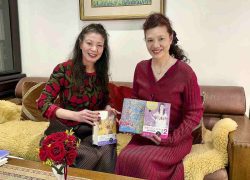Peter Grilli, Long-time Friend of Donald Keene Devoted to Cultural Exchange between Japan, U.S., Shares Memories of Keene
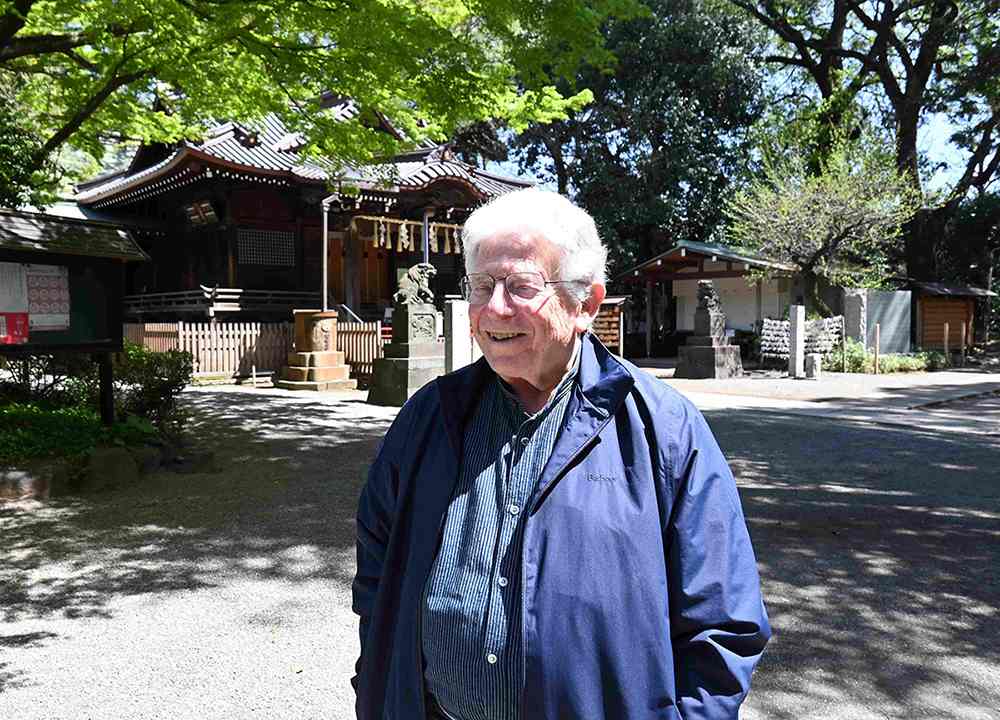
Peter Grilli during an interview at his childhood playground, Yoyogi Hachimangu shrine in Shibuya Ward, Tokyo, on April 10
11:35 JST, April 20, 2024
Peter Grilli, a writer, documentary filmmaker, and former President of the Japan Society of Boston, was a good friend of Donald Keene’s for over half a century. He has made many significant contributions to cultural exchanges between Japan and the U.S., including various events he conducted as the Director of the Donald Keene Center at Columbia University in the 1990s. While Grilli was visiting Japan for the first time in five and a half years, I interviewed him on a day that cherry blossoms were at full peak about his memories of Keene and the current state of cultural exchange between the two countries.
-
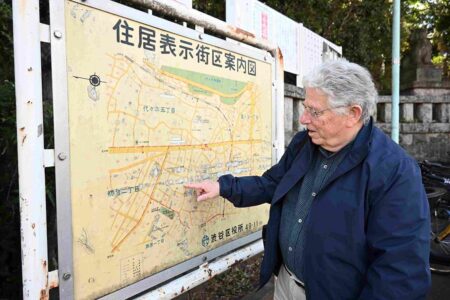
Peter Grilli showing the location of his former house on the residential information board in front of Yoyogi Hachimangu shrine
-
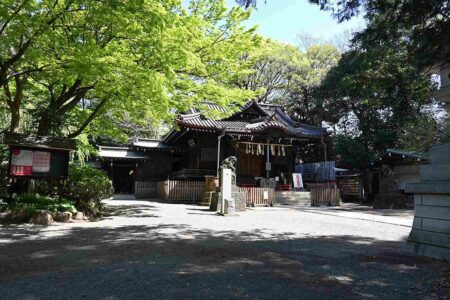
Yoyogi Hachiman shrine, an important location for director Wim Wenders’ recent film “Perfect Days”
-

Stone stairs leading up to Yoyogi Hachimangu shrine
Our meeting place was Yoyogi Hachimangu shrine in Shibuya Ward, Tokyo. Grilli had suggested that we meet at the shrine, and there was a reason for that. The grounds of the shrine appear as an important location in Wim Wenders recent film “Perfect Days,” and when Grilli saw the film he instantly recognized the location as a favorite spot from his childhood in Tokyo. The 81-year-old Grilli had lived nearby for two years beginning in 1948, when he was five years old, and the shrine was his beloved playground. Grilli, who calls this trip a sentimental journey, wanted to return to the place of his childhood memories.
As we climbed the stone steps leading up to the main shrine, he said, “In the film, there is a scene where the lead actor, Koji Yakusho, sitting on a bench here at Hachimangu shrine, looks up at the trees and says, ‘These trees are my friends.’ When I saw that, I thought, ‘That’s exactly what I used to think.’ The same trees are still here, and they are still my friends.” The house nearby where he had lived with his family is now the Embassy of Vietnam.
Reaching Ordinary People
-

Peter and Susan Grilli, at dinner at Donald Keene’s home in Tokyo on October 25, 2017. (Courtesy of Peter Grilli)
-

Peter Grilli and Donald Keene at the Shigemitsu Mamoru Award ceremony in Tokyo, December 2012. (Courtesy of Peter Grilli)
“I think I first met Donald Keene in Japan, but I don’t remember exactly. I was never Donald’s student,” Grilli began to speak, sitting on the same bench where Yakusho sat in the movie. Starting from 1995, when Grilli became Director of the Donald Keene Center at Columbia University, the two met almost daily in New York while Keene was there for six months every year. “We talked about ordinary things, not so much about Japanese literature. We talked mostly about music, opera, cooking and occasionally a little bit about literature, too.”
The Center had been founded in 1986 by Barbara Ruch, a former student of Keene’s and herself a professor at Columbia University, with the aim of extending understanding of Japanese culture beyond the academic world to the broader American public.
During his five years as Director of the Donald Keene Center, Grilli presented many concerts, films, symposia and public performances. One example was a big international symposium about Chikamatsu Monzaemon (1653-1725), the great Edo period (1603-1867) playwright, inviting well-known Japanese professors, filmmakers, actors and theater professionals who had specialized in Chikamatsu’s plays. “Donald loved that kind of thing,” Grilli recalled. “Early in his own academic career, he had studied and translated many of Chikamatsu’s plays, and throughout his life he had a special love for the bunraku puppet theater. He was unquestionably a great professor and translator and he did superb academic work as a scholar. But he was also deeply interested in how ordinary people perceived Japan. His books, and research are of course essential studies of Japan, but he also wanted ordinary people to read them and come to understand and appreciate Japanese culture. In that way, I think Donald was quite unusual.”
Grilli felt a similar sense of responsibility to the general public. That is why Grilli was determined to share his own love of Japanese films, music, kabuki, bunraku, and other popular Japanese arts with American audiences. Earlier in his own career as a program director at the Japan Society of New York, Grilli had produced major presentations of Japanese arts to large public audiences.
Broader Cultural Relationships
-
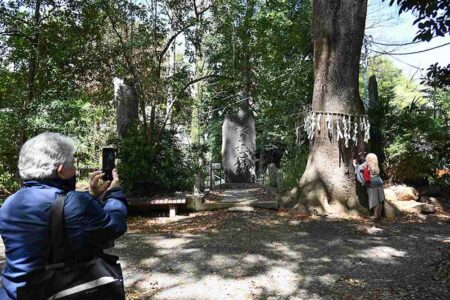
During the interview, visitors to the shrine came one after another to the sacred tree on the shrine grounds, embracing the tree and praying.
-
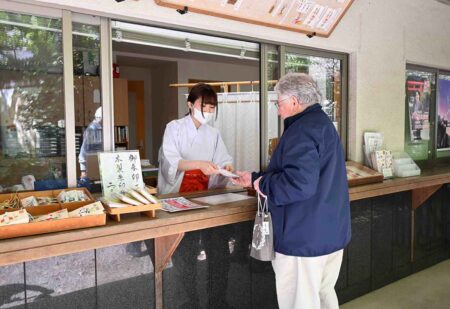
Peter Grilli buying traffic safety amulets at the shrine
“Donald was a giant!” Grilli recalled of Keene’s many accomplishments. “He did so much. Many of his books were written for ordinary people, in a style that is fairly easy to read. In that sense, his role was very extremely important.”
Grilli commented that Japanese studies in the U.S. are now in their third or fourth generation. Keene was a leader of the first postwar generation, together with Edwin O. Reischauer, Edward Seidensticker and a few others. They were the pioneers, followed by a second generation that learned from them, and now it is time for a new generation of writers and scholars, to carry forward their work.
The pioneering Keene wrote the following message in a 2013 tribute book honoring the achievements of Peter Grilli, his friend and colleague.
“It doesn’t seem possible, but I think I have known Peter for fifty years. The difficulty in recognizing this fact comes from his not having changed either in appearance or enthusiasms. His constancy shows in his love for the classics of music: even works he has heard countless times, he still hears with excitement. His unfailing taste enables him also to discover and enjoy what is of genuine worth in the new.”
Grilli moved to Boston in 2000 and became President of the Japan Society of Boston, where he has devoted himself to cultural exchange between Japan and Boston. The Japan Society of Boston is the oldest Japan Society in the U.S., celebrating its 120th anniversary this year. John Manjiro (Nakahama Manjiro), the famous Japanese fisherman who, in 1841, was rescued by an American whaling ship after being lost at sea in the Pacific Ocean, later arrived in the U.S., and lived near Boston, Massachusetts, where the Japan Society of Boston is located. The Museum of Fine Arts, Boston and the Peabody Essex Museum of Salem also have renowned collections of Japanese fine arts as well as the everyday items of Japanese commoners during the Edo and Meiji eras (1868-1912), collected by Edward Morse, who discovered the well-known Omori Kaizuka Shell Mounds archaeological site.
During my interview with Peter Grilli, I felt his warm personality and passion for Japanese culture. Similarly, Donald Keene wrote this message in the tribute book.
“Peter is a great collector, not so much of recordings of music as of people. His warmth and concern for others makes friends even of strangers. I know no one who has as many friends in Japan and that must be true of Boston as well.”
As we sat talking quietly at Yoyogi Hachimangu shrine, we noticed a visitor embracing a large sacred tree in the vicinity of the shrine, across the way from our bench. She seemed to be praying to the tree, and Grilli gazed at her intently.
“It’s interesting,” he said. “How traditional cultural values seem to be preserved in such places.” And then, he continued: “The opportunities for cultural exchanges are much greater now between Japan and other countries. For example, just consider the JET program, where young people come and teach in local Japanese communities spending two or three years. They go back to their native countries, where some of them — remembering their friendships in Japan — continue to work in Japan-related businesses or in Japanese studies. That’s a vital new kind of relationship which, I am sure, will become increasingly important in the future.”
Top Articles in JN Specialities
-
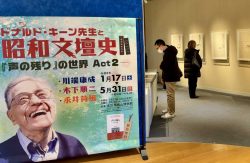
Exhibition Shows Keene’s Interactions with Showa-Era Writers in Tokyo, Features Newspaper Columns, Related Materials
-

The Japan News / Weekly Edition (2/20-2/26)
-

Step Back in Time at Historical Estate Renovated into a Commercial Complex in Tokyo
-

Senior Japanese Citizens Return to University to Gain Knowledge, Find New Career, Make Friends
-

“The Tale of Genji” Back-Translation Project Led to Touching Encounter with Keene; Poet Sisters Recount Memories of Scholar at Packed Talk Event in Tokyo
JN ACCESS RANKING
-

Producer Behind Pop Group XG Arrested for Cocaine Possession
-

Japan PM Takaichi’s Cabinet Resigns en Masse
-

Man Infected with Measles Reportedly Dined at Restaurant in Tokyo Station
-

Israeli Ambassador to Japan Speaks about Japan’s Role in the Reconstruction of Gaza
-

Videos Plagiarized, Reposted with False Subtitles Claiming ‘Ryukyu Belongs to China’; Anti-China False Information Also Posted in Japan



